TAX, BUT HEAR ME !
WE referred last week to a very valuable article in the January number of the Quarterly Review on o• The Burden of Taxation." It is a great satisfaction to find that the extremely well-informed writer of that article reinforces the demand which was made recently by Mr. Herbert Gibbs, and which we have strongly supported from time to time, that there should be an inquiry as soon as possible into the whole incidence of taxation. Our methods of direct taxation were proved by the War to have extreme and unexpected elasticity. Amounts which had not been dreamed cif as possible were raised with comparative ease. But we have now reached a point where it looks as though the elastic has been stretched so far that it may easily snap if stretched any more, or even if it is kept at its present tension. The danger to the country is real and we know of few subjects which more urgently need investigation.
No inquiry of the necessary scope has ever been held, though there have been contributory private inquiries, the materials of which would be invaluable to a Com- mission or a Committee. Before the War, for example, Sir Bernard Mallet, Sir Herbert Samuel, Sir Josiah Stamp and Dr. Bowley made various attempts to analyse the national wealth and the taxable capacity of the community. The writer in the Quarterly quotes Sir Herbert Samuel as saying in his address to the Royal Statistical Society in 1919—" we cannot say whether- the burdens are justly distributed unless we first know what they are." There is a widespread suspicion among economists that the tremendous increase of direct taxation which has been going on since 1907 has tilted the balance too far against a particular class. The increase became very noticeable as the result of Mr. Lloyd George's Budgets, and then the War brought about the greatest increase of all. No decent person - wants to argue that the richer people should not pay much more—even proportionately much more we mean —than poor people. But if it be true that the present taxation has brought the accumulation of Capital to a standstill, the chief sufferers will undoubtedly be the poorer classes. There would be no new life-blood to pour into industry and cure the anemia from which it is suffering. Of course it might be discovered on inquiry that the primary incidence of the taxes con- formed as closely as possible to the theoretical standards of " taxable capacity." That, however, remains to be proved, and it is in order to prove it or disprove it that we want an inquiry.
When men who have always been respectable citizens, not merely willing but anxious to abide by the law and serve the country well, rack their brains to discover means of dodging the law without actually getting on the wrong side of it so as to expose themselves to penalties, it is a sure sign that the law has somehow become too onerous or too exasperating to be borne. In connexion with direct taxation there are many such signs. We hear of private estates being turned into companies ; of heads of families creating trusts for educating and supporting their children ; of distributions of property in the life-time of the owners, and so on. All these things are done in order to avoid direct taxation which, if it had been paid in the ordinary way, would have ruined the estate or made it impossible to educate the children in the way desired. As the writer in the Quarterly says, it is well known that large super-tax payers are frequently unable to find money for the duty, and it is significant that in such cases the Revenue authorities are content to get what they can on account and refrain from proceedings to sell up the defaulters.
One of the greatest moral disadvantages of the present division of direct taxation into such classes as Income Tax, Super Tax, and Corporation Tax is that the nation as a whole is quite unaware of the proportion of his income that is paid away by the man conventionally called " rich." Of large incomes over a half is paid away in Income Tax and Super Tax, and if Death Duties in terms of income are included—as they should be in any consideration of " taxable capacity "—about two-thirds of the annual income is paid away. The orator at the street corner tells you that our millionaires paid Cis. in the £, but that they have had ls. knocked off that and that now they have the impertinence to demand another ls. off in the next Budget. A new Mark Antony might address a magnificently ironic speech to the nation on the theme that " 'Tis good you know not that you are his heirs "—or at least the beneficiaries, if not the heirs, of the rich man who pays so much. The nation knows nothing about it.
The writer in the Quarterly suggests that a small Committee of Inquiry on the model of the Geddes Com- mittee would probably be preferable to a Royal Com- mission. We think he is right. The Geddes Report was a masterly performance and we could not do better than follow so good an example. Promptness in this case would be one of the greatest virtues. We greatly hope that it may be possible to have an inquiry even before the next Budget. If the Committee could tell us what is the maximum total revenue that can be safely raised from the nation they would confer an incalculable boon upon us all. We should then begin the consideration of expenditure from the right end and not from the wrong end as at present. It is easy to prove that this and that item is " necessary " ; and -when you have added up all the " necessary " items you are committed to spend more than you have got. The right way is to find out how much you have got and then to cut the cloth of your expenditure accordingly That, however, is an incident in our present argument, though a very important one. We particularly hope that the Committee will be able to recommend a drastic simplification of direct taxation.
The bewilderment caused to the individual taxpayer by the various forms which now demand payment of what is in essence the same tax is really intolerable. Some people spend a grotesque proportion of their working time in trying to find out what amount they ought to pay, or perhaps, to put it in another way, what demands they can safely evade. We suppose that many busy employers who used to fill up forms for them- selves have abandoned the task altogether and placed it in the hands of professionals. Surely it is enough to make any man pay year by year a single tax according to his income. The income from all sources can be annually determined and the assessment could follow as naturally as night follows day. Of course, there must be graded taxation, but we cannot see any necessity at all for the divisions into Income Tax, Super Tax, and Corporation Tax.
No self-respecting citizen objects to paying what in justice he ought to pay, but he does object to being worried out of his life besides. We desire earnestly to place the plea of harassed men before the Government. It is time that they were listened to seriously. " Tax, but hear me " expresses at one and the same time their admission of their obligation and their crying grievance.











































 Previous page
Previous page